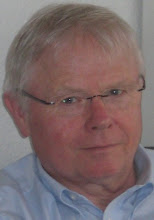For my friend Nureddin. One of our prominent German theologians is Eberhard Jüngel (photo) from Tübingen. He wrote* about the affinity between Christian faith and democracy beginning critically, saying that faith makes a difference between the union of believers and the political community. That is why faith sees church and state fundamentally different. Nevertheless Jüngel finally came to the conclusion that among the existing forms of government democracy is the one that fulfills Christian criterias for a good government best.
One of our prominent German theologians is Eberhard Jüngel (photo) from Tübingen. He wrote* about the affinity between Christian faith and democracy beginning critically, saying that faith makes a difference between the union of believers and the political community. That is why faith sees church and state fundamentally different. Nevertheless Jüngel finally came to the conclusion that among the existing forms of government democracy is the one that fulfills Christian criterias for a good government best.
I thought about Jüngel these days when in many places of the world the question is discussed whether there is an affinity between another faith and democracy – the Muslim faith. The question here obviously has a much sharper edge. Imagine a representative of the German Muslims saying something similar like Jüngel on German TV. He would immediately be blamed for seeing democracy only as a sheltered garden where sharia can grow and overgrow in the end all other plants.
In spite of this you meet an increasing number of modern Muslims who are, in many ways like Jüngel, convinced that they can live their faith nowhere better than in the framework of a western style democracy. They do not want to rearrange this framework, because they live in states where many different religions meet, with atheism as a secret main religion included. A rearrangement according to the principles of a single religious idea would only lead to a destructive form of tyranny.
These modern followers of Mohammed that want to reconcile Islam and democracy have many adversaries. Prominent among them are the Christians whose mistrust in any form of an earthly kingdom of God is paradoxically rooted in the historical experience that there is almost no way to bring about such a kingdom. The Christian mistrust is mirrored by those among the Muslims who also have the image of a kingdom of God before their inner eye and do not want to sacrifice it for a democracy that is seen as atheistic.
There is right now a bloody borderline in Tehran that separates the fundamentalist rulers from their reformist adversaries who, under the leading of Mir Hossein Mousavi have that one goal: to reconcile the old faith with a modern form of government and lifestyle. Ahmadinejad is known to be among those who think reconciliation impossible (more details in a New York Times article). Odd enough among the hardest critics of the regime in Iran are also those that do not believe in reconciliation either. They occur in the Internet as radical Infidel Bloggers Alliance.
The question of reconciliation is also in Turkey far from being answered. The governing party of Prime Minister Erdogan believes in it, the opposition doubts it and takes the founder of modern Turkey, Kemal Atatürk as a witness. Apart from this scepticism there seems to be a traditional Turkish preoccupation against any form of Arabian government that makes it even harder to believe that there could ever be a working democracy in one of the Muslim main lands. This preoccupation lingers also in the mind of many of my fellow Germans and makes them half-hearted supporters if not critics of the democratic movement in Iraq. They would nevertheless not admit that, and would keep hidden behind their moral superiority over George Bush.
Also Israel has to ponder permanently whether Islam and democracy can go together. In the question of an independent Palestinian state the strongest forces of opposition arise from the doubts that this necessarily Muslim state could ever be democratic and thus reliable in its commitment to peace. The neighbours in Syria and Egypt and in some other countries obviously seem to give proof to the theory of both the radical conservatives and the radical progressives in the Near East that Islam and democracy do not fit.
Where are the friends and supporters of a possible reconciliation? In many personal meetings with modern Muslims I have seen a deep desire to be a natural part of what we call, a little simplifying the “Western World”. It is not western any more, it is rather an omnipresent area where people have the possibility of a worldwide exchange. The reign of this area has included more and more people in the last years and decades, and still more are waiting to be admitted.
I see Muslims everywhere that want to be part of this world, and see that, once they become actual members – as an example the Turks in Germany – show a high level of contentment with this world and the way they can lead their lives there.
These people want – also – to be religious. Many have to be religious in order to keep their inner voice of conscience audible in this noisy modern world full of voices. These people could be the heralds of a new reconciled way. You just have to open the door for them and give them a chance, in Iran, in Iraq, among the German Turks and everywhere.
*Eberhard Jüngel, Hat der christliche Glaube eine besondere Affinität zur Demokratie?
S. 111
..."der christliche Glaube die Gemeinschaft der glaubenden vom politischen Gemeinwesen und dementsprechend Kirche und Staat fundamental voneinander unterschieden weiß"
S. 377
"Unter den real existierenden Staatsformen ist die parlamentarische Demokratie diejenige, die den genannten Zumutungen mehr als jede andere entspricht."
Friday, July 3, 2009
Democracy and Faith
Subscribe to:
Post Comments (Atom)


No comments:
Post a Comment